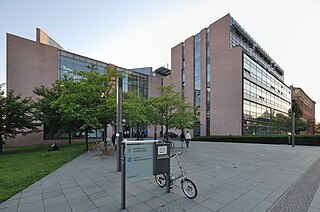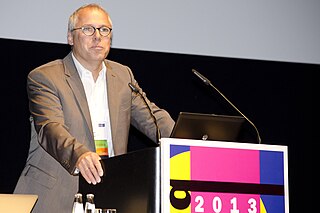
The Max Planck Society for the Advancement of Science is a formally independent non-governmental and non-profit association of German research institutes. Founded in 1911 as the Kaiser Wilhelm Society, it was renamed to the Max Planck Society in 1948 in honor of its former president, theoretical physicist Max Planck. The society is funded by the federal and state governments of Germany.

The Kaiser Wilhelm Society for the Advancement of Science was a German scientific institution established in the German Empire in 1911. Its functions were taken over by the Max Planck Society. The Kaiser Wilhelm Society was an umbrella organisation for many institutes, testing stations, and research units created under its authority.

The Max Planck Institute of Biochemistry (MPIB) is a research institute of the Max Planck Society located in Martinsried, a suburb of Munich. The institute was founded in 1973 by the merger of three formerly independent institutes: the Max Planck Institute of Biochemistry, the Max Planck Institute of Protein and Leather Research, and the Max Planck Institute of Cell Chemistry.

The Max Planck Institute for Gravitational Physics is a Max Planck Institute whose research is aimed at investigating Einstein's theory of relativity and beyond: Mathematics, quantum gravity, astrophysical relativity, and gravitational-wave astronomy. The institute was founded in 1995 and is located in the Potsdam Science Park in Golm, Potsdam and in Hannover where it closely collaborates with the Leibniz University Hannover. Both the Potsdam and the Hannover parts of the institute are organized in three research departments and host a number of independent research groups.

Peter Gruss is a German developmental biologist, president of the Okinawa Institute of Science and Technology, and the former president of the Max-Planck-Gesellschaft.
The Max Planck Institute for Molecular Genetics is a research institute for molecular genetics based in Berlin, Germany. It is part of the Max Planck Institute network of the Max Planck Society for the Advancement of Science.

The Max Planck Institute for Molecular Biomedicine was founded on 1 April 2001 in Münster, North Rhine-Westphalia, Germany. It is part of the Max Planck Society. The current managing director is professor Dietmar Vestweber.

The Max Planck Institute of Molecular Cell Biology and Genetics (MPI-CBG) is a biology research institute located in Dresden, Germany. It was founded in 1998 and was fully operational in 2001. Research groups in the institute work in molecular biology, cell biology, developmental biology, biophysics, and systems biology supported by various facilities.

The Max Planck Institute for Infection Biology (MPIIB) is a non-university research institute of the Max Planck Society located in the heart of Berlin in Berlin-Mitte. It was founded in 1993. Arturo Zychlinsky is currently the Managing Director. The MPIIB is divided into nine research groups, two partner groups and two Emeritus Groups of the founding director Stefan H. E. Kaufmann and the director emeritus Thomas F. Meyer. The department "Regulation in Infection Biology" headed by 2020 Nobel laureate Emmanuelle Charpentier was hived off as an independent research center in May 2018. The Max Planck Unit for the Science of Pathogens is now administratively independent of the Max Planck Institute for Infection Biology. In October 2019, Igor Iatsenko and Matthieu Domenech de Cellès established their research groups at the institute, Mark Cronan started his position as research group leader in March 2020. Silvia Portugal joined the institute in June 2020 as Lise Meitner Group Leader. Two more research groups where added in 2020, Felix M. Key joined in September and Olivia Majer in October, completing the reorganization of the Max Planck Institute for Infection Biology.

The Max Planck Institute for the Science of Light (MPL) performs basic research in optical metrology, optical communication, new optical materials, plasmonics and nanophotonics and optical applications in biology and medicine. It is part of the Max Planck Society and was founded on January 1, 2009 in Erlangen near Nuremberg. The institute is based on the Max Planck Research Group "Optics, Information and Photonics", which was founded in 2004 at the University of Erlangen-Nuremberg, as a precursor. The institute currently comprises four divisions.

Eugene Wimberly "Gene" Myers, Jr. is an American computer scientist and bioinformatician, who is best known for contributing to the early development of the NCBI's BLAST tool for sequence analysis.

Stefan Hugo Ernst Kaufmann is a German immunologist and microbiologist and is one of the highly cited immunologists worldwide for the decade 1990 to 2000. He is amongst the 0.01% most cited scientists of ca. 7 million scientists in 22 major scientific fields globally.

The Max Planck Institute for the Physics of Complex systems is one of the 80 institutes of the Max-Planck-Gesellschaft, located in Dresden, Germany.

Roger Sidney Goody is an English biochemist who served as director at the Max Planck Institute for Molecular Physiology in Dortmund from 1993 until 2013. Since 2013 he is Emeritus Director of the institute.

Thomas Lengauer is a German computer scientist and computational biologist.

Martin Vingron is an Austrian mathematician working in the fields of bioinformatics and computational biology. Since 2000, he has been Director of the Max Planck Institute for Molecular Genetics.

Janet Kelso is a South African computational biologist and Group leader of the Minerva Research Group for Bioinformatics at the Max Planck Institute for Evolutionary Anthropology. She is best known for her work comparing DNA from previous humans with those of the present.
Dagmar Schäfer is a German sinologist and historian of science. She is director of Department III, Artifacts, Action, Knowledge at the Max Planck Institute for the History of Science, Berlin. She is honorary professor for the history of technology, Technical University, Berlin; adjunct professor, Institute of Sinology, Freie Universität, Berlin, and Tianjin University (2018–2021). She was previously a Guest Professor at the School of History and Culture of Science, Shanghai Jiao Tong University. She was also the director of the Centre for Chinese Studies and held the professorial chair of Chinese Studies, both at the University of Manchester.

Christoph Bock is a German bioinformatician and principal investigator at the Research Center for Molecular Medicine (CeMM) of the Austrian Academy of Sciences and a visiting professor at the Medical University of Vienna.
Dirk Görlich, born October 18, 1966 in Halle (Saale) of Germany, is a German biochemist. He is now Director at the Max Planck Institute for Multidisciplinary Sciences in Göttingen.
















